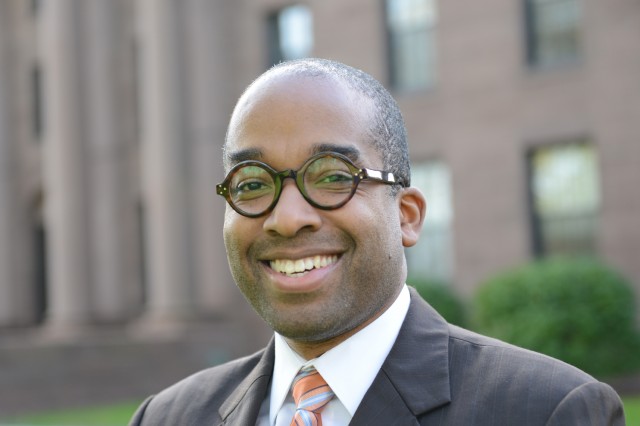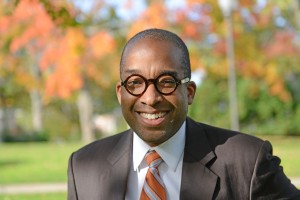5 Questions With . . . Michael Dorsey on COE’s Think Tank

In this issue of The Wesleyan Connection, we ask “5 Questions” of Michael Dorsey, visiting professor of environmental studies. In September, he was reappointed to the Environmental Protection Agency’s National Advisory Committee.
Q: Professor Dorsey, you’re a visiting professor of environmental studies and a fellow in the College of the Environment’s Think Tank. What is the 2012-13 Think Tank theme, and what is your role in the year-long exploration?
A: The 2012-2013 College of the Environment’s Think Tank theme is: environmental justice and global health.
Despite growing awareness of the problems of environmental injustice and related impacts on health and sustainability, many communities here in the U.S. and around the globe remain vulnerable or are being put at risk in new ways. This year’s COE Think Tank will use our collective interdisciplinary strengths and practical experience to seek to tackle these complex issues. Using complementary, yet distinct, disciplinary approaches to examine the connection between environmental justice and global health, we will explore the health and livelihood implications of environmental injustice from local to global scales –from neighborhood struggles for food justice to regional responses to mountaintop removal in Appalachia and environmental activism in East Asia to the plight of island communities facing unfolding global climate disruption.
Q: Why did you want to be part of the Think Tank, and what do you hope will be accomplished?
A: The College of Environment’s Think Tank is a novel, innovative space for learning; it is a unique space for environmental autodidactical fellowship. Individual learning blossoms as a result of camaraderie and collegial labor—of both peer faculty and dynamic student fellows. The admixture of the Think Tank, making student and faculty “peer fellows,” is rare and was particularly attractive. An additional draw was the Think Tank and the College of Environment’s founding “belief in the resilience of the human spirit and a desire to develop a long-term vision of human and ecosystem health.”
Q: How do you describe your academic interests? Do you focus on environmental governance?
A: My research seeks to understand how theories underscoring political ecology, political economy, and institutional and organizational behavior explain and inform myriad efforts to manage the environment and shape sustainable development. Using these theoretical frameworks, I examine policies relating to the manipulation, control, and exploitation of ecological resources, as well as discourses and practices of sustainability and sustainable development. I am particularly committed to furthering analyses of the multitude of ways in which (in)justice and (in)equity (re)frame and shape environmental discourses, policies, institutions and practices.
Hence I do work on environmental governance problems. Specifically, I examine how environmental and sustainable development governance policies shape the management of biodiversity and climate.
At the broadest levels, my research into efforts to manage the climate system and biodiversity provide a framework for reconceptualizing and reconsidering market-based environmental management and approaches to sustainability over the longer term.

Q: You’ve written several articles. What are some of the topics?
A: In one of my earlier publications in the 2003 SUNY Press book Contested Nature: Power, Protected Areas and the Dispossessed–Promoting International Biodiversity Conservation with Social Justice in the 21st Century, I argue that: “In a vacuum of international standards and norms, where practical and credible regulatory, monitoring and enforcement mechanisms are non-existent, the theft of local knowledge and the adverse consequences for conservation will only accelerate in the years ahead.”
In a series of articles, the most recent in the Australian Journal of Political Economy, I have been considering how and why particular institutions like transnational corporations, non-governmental organizations, multilateral agencies, inter alia, propose to manage atmospheric compounds like carbon dioxide and other greenhouse gases (GHGs) at local to global scales, explicitly using and promoting neoliberal market techniques. Just this year Australia and the European Commission announced they will seek to link their two carbon trading schemes.
Q: In July 2010, Lisa Jackson, the U.S. Environmental Protection Agency (US-EPA) Administrator, appointed you to the EPA’s National Advisory Committee, and you were reappointed in September. What topics do you advise on?
A: As a member of the national advisory committee, I advise Administrator Jackson and her senior staff on specific U.S. government policy issues related to the implementation of the North American Agreement on Environmental Cooperation—which is part of the North American Free Trade Agreement. The Committee is responsible for providing recommendations to help assure that business and industry, academia, and non-governmental organizations are represented in the development of U.S. policy positions regarding implementation of the Environmental Supplemental Agreements to the North American Free Trade Agreement.

